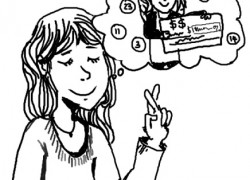
By the time you read this, the Mega Millions-lottery winners will have begun the fourth day of the happiest week of their lives.
Maybe they’ve started preparations for their very own Versailles. Perhaps they’ve dined on Wagyu rib-eyes, caviar and a 30-year-old bottle of Montrachet wine three nights straight. No doubt yesterday was the most anti-Garfield Monday that will ever be: Co-workers indubitably casting the stink eye as they cruise into work in a new, red 2013 Ferrari, with all medical payments, taxes and family taken care of — without a care in the world.
Right?
The sad truth is that these 1-percenters don’t have much hope of maintaining and developing the wealth they’ve recently landed, especially if they’ve chosen to lead the lotto life.
The record-breaking Mega Millions lottery ballooned up to $656 million in the hours before the Friday-night drawing, dwarfing the previous record of $390 million held in March 2007. Then on early Saturday morning, the holders of the 1.5 billion tickets sold held their breath as the numbers were announced one by one.
Three ticket-holders from Kansas, Maryland and southern Illinois shared the largest jackpot in U.S. history.
The mass of wealth had a lot of people sweating bullets about their chances. For those who are curious, it was 1 in 175,711,536, according to the Michigan state government’s website. In other words, you were 9,777 times more likely to be murdered or 13 times more likely to pick the perfect N“CAA bracket”:http://www.deseretnews.com/top/542/2/Picking-a-perfectNCAA-bracket-20-things-more-likely-to-happen-than-winning-the-Mega-Millions.html. The odds of winning were certainly against us.
That enormous success can come swiftly to absolutely any one person, and perhaps without even lifting a finger — it’s this mentality that keeps our society eager to make the gamble.
It’s this mentality that also has driven these winners into the dirt.
Take Abraham Shakespeare, the winner of the $31 million Florida jackpot in 2006. Three years later, his fortune was mostly spent, and the man had gone missing — to be found under a concrete slab some time later. If you followed Billie Bob Harrell Jr., the winner of the $31 million Texas jackpot in 1997, you’d find out he committed suicide 20 months later, after his marriage dissolved and “his spending and his lending spiraled out of control,” wrote Steve McVicker in The Houston Press. The media might remember the already-wealthy West Virginian business man, whose unfortunate winning cost him the lives of his daughter and granddaughter and made him attractive to a string of robberies.
“The dream you have about winning may be better than the actuality of winning,” said Steven Danish, a professor in psychology and social and behavioral health at Virginia Commonwealth U., in an interview with ABC News. “There have been families that have just — just been torn apart by this process.”
Still, the dream is compelling. Even if we fully understood the abrupt, unsettling truths that come with sudden wealth and the flood of tumultuous lifestyle changes that characterize winning, many would still risk it all for the chance at this disillusioned life of “happiness.” To pass it up would be un-American — against the very essence of human nature even.
A few key studies in recent years point to how well wealth and happiness correlate and, more importantly, how much happiness money can actually buy.
According to a study conducted by the Center for Health and Well-being at Princeton U. published in 2010, an income of $75,000 a year was found to be the threshold, beyond which no significant improvement to emotional well-being can be observed. In the study, much of what people define as emotional well-being is based on spending time with the people they like, leisurely activities and general life satisfaction.
In summary, “more money does not necessarily buy more happiness, but less money is associated with emotional pain.” The key is to realize the value of the life we lead, understanding that earned wealth makes life comfortable and, therefore, enjoyable. Hoping a sudden pool of massive wealth might amplify all of the day-to-day joys and general satisfaction of life, however, is unreasonable and dangerous.
As for the trio that split this weekend’s grand prize, may you have the best of luck and be wise in investing. Otherwise, there might be an uglier end in store than that of Shirley Jackson’s “The Lottery.”
